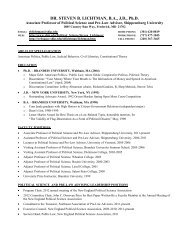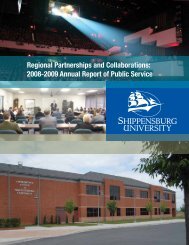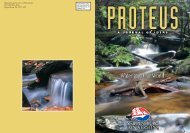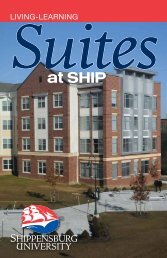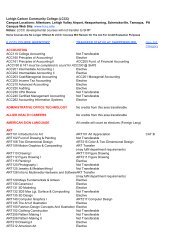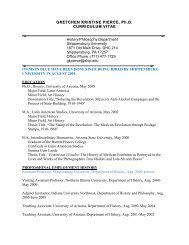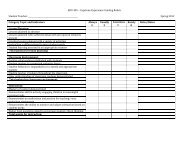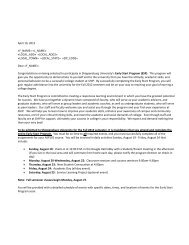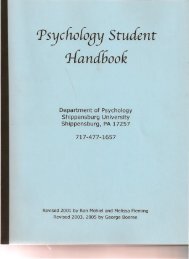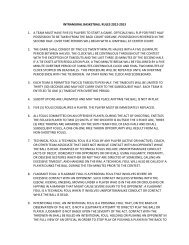University Police - Shippensburg University
University Police - Shippensburg University
University Police - Shippensburg University
- No tags were found...
You also want an ePaper? Increase the reach of your titles
YUMPU automatically turns print PDFs into web optimized ePapers that Google loves.
<strong>University</strong><strong>Police</strong>Campus safety & security/fire statistics 2013ship.edu/police
Table of ContentsSafety and Security Overview................................................. 1Crime Reports (2010-2012)...................................................... 2<strong>University</strong> Student/Employee Population.............................. 4Responsibility for campus security......................................... 4Reporting criminal incidents to State and Local <strong>Police</strong>......... 4Encouraging the reporting of crime....................................... 5Procedures for reporting criminal activity.............................. 5Notification of emergency response and evacuationprocedures........................................................................... 6Informing the campus about an immediate threat............... 7Campus evacuation procedures............................................. 9Persons with Disabilities Evacuation Procedures........... 10Access to the <strong>University</strong>’s facilities and programs............. 10Programs about housing security and enforcement.......... 11Types of student housing ..................................................... 11Fire safety measures.............................................................. 11Fire Alarm System Description........................................ 13Mandatory Supervised Fire Drills..................................... 13Campus Map.......................................................................... 14Plans for Future Fire Safety Improvements..................... 16Housing assignments and requests for changes................ 16Security of student-housing facilities .................................. 17SU employees assigned to <strong>University</strong> housing facilities ... 17Housing students during low occupancy periods.............. 17Housing guests....................................................................... 18Security considerations in facilities maintenance............... 18Possession, use or sale of alcohol and illegal drugs .......... 18Possession and use of weapons........................................... 19Students or employees with criminal records.................... 19Drug and alcohol abuse educational programs.................. 20Penalties for abuse of drugs and alcohol ............................ 21Notice of Non-Discrimination and Sexual Harassment...... 22Sex offenses (education, policies, and victim assistance). 23Offices that can provide assistance to victims of sexcrimes............................................................................ 24Monitoring off-campus crime............................................... 24Reporting incidents for on-campus properties................... 25Reporting incidents for campus residential facilities.......... 25Reporting incidents for non-campus properties................. 25Reporting incidents for public properties............................ 25Responding to crimes involving bias................................... 25Policy on Missing Residential Student Notification ............ 26Emergency Numbers............................................................. 29B
Safety and Security<strong>Shippensburg</strong> <strong>University</strong> of Pennsylvania is a memberof the Pennsylvania State System of Higher Education andis concerned about the safety and welfare of everyone in thecampus community. No campus is entirely isolated from crimeand <strong>Shippensburg</strong> <strong>University</strong> is no exception.<strong>Shippensburg</strong> <strong>University</strong> has developed policies andimplemented procedures in order to increase awareness andprovide precautionary measures for all persons on our campus.The information contained within this publication is designedto provide an overview of the Department of PublicSafety as well as other campus safety and security measuresthat have been instituted at <strong>Shippensburg</strong> <strong>University</strong>. This reportis prepared by the Department of Public Safety, whichincludes the <strong>University</strong> <strong>Police</strong> Department as well as theSafety Department. It is in compliance with the Jeanne CleryDisclosure of Campus Security Policy and Crime StatisticsAct, and is produced in cooperation with local law enforcementagencies, the Division of Student Affairs, the Office ofJudicial Affairs, the Office of Residence Life and Housing,the Student Health Center, the Women’s Center and theCounseling Center in addition to off-campus agencies, thePennsylvania College and <strong>University</strong> Security Requirements(Chapter 33), The Crime Awareness and Campus SecurityAct of 1990 and The Accuracy in Campus Crime ReportingAct of 1997.1
CRIMEREPORTSYearOn CampusPropertyCampusResidential FacilityNon-CampusBuilding/PropertyPublic PropertyTotal IncidentsReportedCrime RateAggravatedAssaultArsonBurglaryDisorderlyconductDriving underthe influenceDrunkennessEmbezzlementForgery andcounterfeitingFraudGamblingLarcenyMotor vehicletheftMurder/non-negligentmanslaughterNon-negligentmanslaughterOffensesagainst familyOther assaultsProstitutionRobbery2012 0 0 0 0 0 .00002011 1 0 0 0 1 .00012010 0 0 0 0 0 .00002012 0 0 0 0 0 .00002011 0 0 0 0 0 .00002010 0 0 0 0 0 .00002012 10 9 1 0 11 .00142011 3 3 1 0 4 .00052010 11 9 0 0 11 .00132012 33 5 0 0 33 .00412011 34 11 0 0 34 .00402010 18 8 0 1 19 .00222012 12 0 0 0 12 .00152011 14 0 0 0 14 .00172010 2 0 0 0 2 .00022012 20 4 0 0 20 .00252011 39 12 0 0 39 .00462010 14 4 0 0 14 .00162012 0 0 0 0 0 .00002011 0 0 0 0 0 .00002010 0 0 0 0 0 .00002012 0 0 0 0 0 .00002011 0 0 0 0 0 .00002010 1 1 0 0 1 .00012012 2 0 0 0 2 .00022011 0 0 0 0 0 .00002010 2 2 0 0 2 .00022012 0 0 0 0 0 .00002011 0 0 0 0 0 .00002010 0 0 0 0 0 .00002012 30 9 2 0 30 .00372011 25 2 2 0 27 .00322010 32 7 1 0 33 .00392012 0 0 0 0 0 .00002011 0 0 0 0 0 .00002010 0 0 0 0 0 .00002012 0 0 0 0 0 .00002011 0 0 0 0 0 .00002010 0 0 0 0 0 .00002012 0 0 0 0 0 .00002011 0 0 0 0 0 .00002010 0 0 0 0 0 .00002012 0 0 0 0 0 .00002011 0 0 0 0 0 .00002010 0 0 0 0 0 .00002012 0 0 0 0 0 .00002011 4 2 0 0 4 .00052010 0 0 1 0 1 .00012012 0 0 0 0 0 .00002011 0 0 0 0 0 .00002010 0 0 0 0 0 .00002012 0 0 0 0 0 .00002011 1 0 0 0 1 .00012010 0 0 0 0 0 .00002
CRIMEREPORTSSex offenses(forcible)*Sex offenses(non-forcible)Stolenproperty,receivedVandalismAll otherDrug abuseLiquor lawsWeaponsviolationsDrug abuseLiquor lawsWeaponsviolationsYearOn CampusProperty*One vandalism incident occurring in a residence hall was classified as a hatecrime. It occurred on 9-7-2012 and was racial graffiti. There were no reportedhate crimes for the years 2010 and 2011.**Individuals not arrested but referred for possible campus disciplinary action.FTEsJAN-DEC 2012 (FTE 8,104)JAN-DEC 2011 (FTE 8,398)JAN-DEC 2010 (FTE 8,485)CampusResidentialFacilityNon-CampusBuilding/PropertyPublic PropertyTotal IncidentsReportedCrime Rate2012 3 3 0 3 3 .00042011 1 0 1 0 2 .00022010 6 4 2 0 8 .00092012 2 2 0 0 2 .00022011 0 0 0 0 0 .00002010 0 0 0 0 0 .00002012 6 3 0 0 6 .00072011 1 0 0 0 1 .00012010 2 0 0 0 2 .00022012 31 9* 0 0 31 .00382011 28 3 0 0 28 .00332010 35 6 0 0 35 .00412012 22 5 1 0 23 .00282011 21 7 0 0 21 .00252010 18 8 1 0 19 .0022ARRESTS2012 43 23 0 0 43 .00532011 19 11 0 0 19 .00232010 8 5 0 0 8 .00092012 182 73 2 0 184 .02272011 275 159 1 0 276 .03292010 177 110 0 0 177 .02092012 0 0 0 0 0 .00002011 0 0 0 0 0 .00002010 0 0 0 0 0 .0000CAMPUS DISCIPLINARY REFERRALS**2012 5 5 2 0 7 .00092011 2 2 0 0 2 .00022010 16 16 0 0 16 .00192012 111 110 0 0 111 .01372011 107 107 0 0 107 .01272010 216 210 0 6 216 .02552012 1 1 0 0 1 .00012011 0 0 0 0 0 .00002010 0 0 0 0 0 .0000Crime rate is calculated by dividing the total number ofreported incidents by the number of full-time equivalent (FTE)undergraduate students, graduate students, and universityemployees. In 2010, for example, there were 11 burglaries reported;11 divided by the total FTE (8,485) equals a crime rate of .0013.3
<strong>University</strong> Student/Employee Population –Fall Semester 2012ENROLLMENTRESIDING ONCAMPUSUndergraduate 6,712 Undergraduate 2,205Graduate 1,012 Graduate 9Total 7,724 Total 2,214Non-Student Employees 907Who is responsible for campus security?The Department of Public Safety is responsible forproviding security and police services on our campus. TheDepartment of Public Safety consists of the <strong>University</strong> <strong>Police</strong>Department; 17 full-time police officers who have receivedtheir training under Act 120 (the Municipal <strong>Police</strong> Officers’Education and Training Act), and their police commissionfrom the governor and the Secretary of Education ofPennsylvania, as well as the <strong>University</strong> Safety Department,which is staffed by a Safety Coordinator and a Safety Clerk.<strong>University</strong> police officers are also required to attend annualupdate training under PA Act 180.All full-time employees of the Department of PublicSafety, in addition to any mandated or specialty training, alsoreceive in-service training annually which includes CPR andfirst aid training.The Department of Public Safety encourages all campusfaculty, staff, students and guests to act responsiblyand to report criminal activity in a timely manner toensure a safe campus environment for everyone.What is the enforcement authority of Public Safetypersonnel?<strong>University</strong> police officers have full authority to enforceall commonwealth and federal laws as well as any applicableuniversity policies. The <strong>University</strong> <strong>Police</strong> Departmentis the police department of jurisdiction on the <strong>Shippensburg</strong><strong>University</strong> campus. <strong>University</strong> police authority includes thepower of arrest on campus property. <strong>University</strong> police officersmay also initiate campus judicial board proceedings for violationsof the Student Code of Conduct, as a sole process forresolution or in addition to criminal charges.What is the SU policy on reporting criminal incidentsto State and Local <strong>Police</strong>?The <strong>University</strong> <strong>Police</strong> Department investigates all incidentsinvolving criminal activity it receives. The departmentmay also coordinate investigations with other outside agencies4
as needed. The university does not have written agreementswith other agencies, however, Pennsylvania legislation, Act48, allows <strong>University</strong> police officers to act outside the campuslimits and with other agencies under specific conditions.All university crime statistics are reported monthly tothe Pennsylvania State <strong>Police</strong> for use in the Uniform CrimeReport and arrest information for offenses as required by statecriminal history record retention laws.What is the SU policy on encouraging the reporting ofcrime?<strong>Shippensburg</strong> <strong>University</strong> and the police departmentstrongly encourage faculty, staff, students, and guests to reportany illegal or suspicious activity in a timely manner tothe <strong>University</strong> <strong>Police</strong>. Those incidents reported to pastoraland professional counselors are not included in campus crimestatistics, however reports of criminal activity that are broughtto the attention of the Dean of Students, Residence Life andHousing Services, any student organization or activity advisor,athletic coaches, intramural sport advisors and medical healthprofessionals are required to be reported and they should bebrought to the attention of the police department either bythe victims or by the person receiving the report as soon aspossible after the report is received. Forms have been providedto those on campus identified as Campus Security Authoritiesfor these reports. Those who report criminal incidents to pastoralor professional counselors are encouraged to voluntarilyreport the incident to the police department on a confidentialbasis. If off campus, individuals are encouraged to reportcrimes to the local police in a timely manner.Providing safety and security are the primary responsibilitiesof the Department of Public Safety and our main goal isto serve and protect the university community. This however,is a goal we cannot achieve alone. We need the cooperationof everyone in the community. As members of the universitycommunity, we all have a moral responsibility and a personalinterest in the maintenance of a safe environment on campusfor all to enjoy. Taking responsibility and reporting crime andsuspicious activities in a timely manner will be beneficial toyou, the university and the entire community.What are the procedures for students and others toreport criminal activity or other emergencies occurringon campus and how does the <strong>University</strong> respond?The campus community can report criminal activityon campus by calling the <strong>University</strong> <strong>Police</strong> Department at(717) 477-1444 (campus extension 1444), in person at the<strong>University</strong> <strong>Police</strong> station located in the Reed OperationsCenter, or by using one of the provided emergency phones.5
These emergency phones are located in various areas throughoutthe campus and report directly to the <strong>University</strong> <strong>Police</strong>station when activated. (See map on page 14 for locations.)Anyone on campus needing assistance in a medical or fireemergency should dial 911.Even if victims of crime do not wish to pursue criminalor judicial charges, they are still encouraged to file a confidentialreport with the Student Affairs Division, or with the<strong>University</strong> <strong>Police</strong>. This allows for information about the incidentto be documented and analyzed while protecting theidentity of the reporting person. Having the university communityfile reports for all incidents that occur on campus allowsthe university to accurately report the number of criminalincidents and determine whether crime patterns are presentto protect the campus community from future criminal acts.The <strong>University</strong> <strong>Police</strong> Department maintains a 24-hourdispatch center, which is staffed by a police officer, to answerall calls for assistance. Upon receiving a request for assistance,an officer along with any other appropriate personnel willbe immediately dispatched to the location. In cases involvingcriminal activity, <strong>University</strong> police officers will respondand conduct an investigation. Information regarding all citationsor arrests made by <strong>University</strong> <strong>Police</strong> for criminal violationson campus is forwarded to the Office of Judicial Affairs.Arrests of university students by municipal or state policeagencies that are brought to the attention of the <strong>University</strong><strong>Police</strong> Department are also forwarded to the Office of JudicialAffairs. All students are held accountable for their behavior onand off campus property.How and when does SU notify the campus communityof emergency response and evacuation procedures?<strong>Shippensburg</strong> <strong>University</strong>’s emergency preparedness planningincludes information about university operating statusparameters; incident priorities and performance expectations;shelter in place and evacuation guidelines; and local contingencyand continuity planning requirements. Individualuniversity departments are responsible for developing contingencyplans and continuity of operations plans for theirrespective staffs and areas of responsibility. Members of theSU Department of Public Safety (SUDPS) assist departmentsin creating their plans. The university annually conducts variousemergency response exercises, such as table-top exercisesand field exercises, and the emergency notification systemsare tested on a regular basis. These tests are designed to assessand evaluate the emergency plans and capabilities of theinstitution.SUDPS officers and supervisors have received trainingin incident command and responding to critical incidents on6
campus. When an incident occurs that causes an immediatethreat to the campus, the first responders to the scene are usually<strong>University</strong> <strong>Police</strong>. Once they respond, they typically workwith members of the <strong>Shippensburg</strong> Borough police and firedepartments, and the Pennsylvania State <strong>Police</strong> to manage theincident. Other local, state, or federal agencies may also be involvedin responding depending on the nature of the incident.General information about the emergency response andevacuation procedures for SU are publicized each year as partof the institution’s Clery Act compliance efforts.All members of the university community are notified onan annual basis that they are required to notify the SUDPS ofany situation or incident on campus that poses a significantemergency or danger that may involve an immediate or ongoingthreat to the health and safety of the campus. SUDPS isresponsible to respond to and summon the necessary resourcesto mitigate, investigate, and document any situation that maycause a significant emergency or dangerous situation. In addition,SUDPS will respond to such incidents to determineif the situation does pose a threat to the community. If it isdetermined that there is a threat, the appropriate universityofficials will immediately notify the campus community or theappropriate segments of the community that may be affectedby the situation.How and when does SU inform the campus aboutan immediate threat and what is the SU policy onnotifying the campus community of an emergency?The <strong>Shippensburg</strong> <strong>University</strong> Crisis CommunicationsPlan and the Emergency Notification Systems Protocolscover official mass communication methods to ensure effectiveand efficient communication and provide accurate andtimely emergency notifications and information to the campuscommunity for situations that are considered a danger oran emergency.When SUDPS confirms that an emergency or dangeroussituation poses an immediate threat to the health or safety tosome or all members of the campus community, the Directorof Public Safety will determine the content of the messageand will use some or all of the systems described below tocommunicate to the campus community, or to the appropriatesegment of the community, if the threat is limited to a particularbuilding or segment of the population.A member of the Department of Public Safety will informthe Executive Director for <strong>University</strong> Communications &Marketing of any dangerous or emergency situation of whichit is aware that may present an ongoing or continuing threat sothat the campus community may be alerted. This notificationincludes any incident that poses a serious threat to the campus7
community that is reported to the university, whether the incidentoccurred on campus or at a nearby off-campus location.In these situations, a “Safety Alert” will be issued to all universitymembers through multiple communication methods. TheDirector of Public Safety will, without delay and taking intoaccount the safety of the community, determine the content ofthe notification and initiate the notification system, unless issuinga notification will, in the judgment of the first responders(including, but not limited to SUDPS, <strong>Shippensburg</strong>Borough <strong>Police</strong> Department, Pennsylvania State <strong>Police</strong>, and/or <strong>Shippensburg</strong> fire and emergency medical services), compromisethe efforts to assist a victim or to contain, respond to,or otherwise mitigate the emergency.The university relies on a series of varied communicationmethods to provide information during an emergency ordangerous situation. These communication methods include,but are not limited to, emergency text messaging system, e-mail, change websites to reflect information, outdoor/indoorpublic address systems, emergency broadcast system (EBS) oncampus radio/TV stations, computer screen pop-up system,and social media sites like Facebook and Twitter. Use of thetext alert system is the first method used in all life-threateningsituations and the information sent to all registered users.Other information, such as a description of the event(s), adescription of suspects and related pertinent crime preventioninformation may also be provided.Initial emergency communications will be sent immediatelyand will convey only the most critical information.Details will be carried on the university’s homepage, whichwill be updated as circumstances dictate.<strong>Shippensburg</strong> <strong>University</strong>’s Crisis Communications Planis part of the university’s overall planning in response to variouspossible emergencies. While each crisis is different, thisplan provides guidelines for the various methods the universitywill use to communicate with our constituencies whichinclude, but are not limited to, students, faculty, staff associates,administrators, parents, alumni, and external groups.In the event of a serious incident that poses an immediatethreat to members of the SU community, the university hasvarious systems in place to communicate information quickly.The main objective of the plan is to provide informationquickly and effectively to appropriate audiences. The plan isreviewed periodically to ensure that it meets the needs of thecampus community and is current with changing technologies.The university will issue an “all clear” message to conveythe university’s return to normal operations to all faculty, staffand students via university assigned e-mail accounts, the university’swebsite, and text message to “SU Alert” subscribers.8
Anyone with information about criminal and/or inappropriateactivity that may warrant notification to the campuscommunity should contact the <strong>University</strong> <strong>Police</strong> Departmentat (717) 477-1444 or in person at the <strong>University</strong> <strong>Police</strong>Department in Reed Operations Center (Building #13 oncampus maps). All information received will be analyzed bythe SUDPS to determine the threat level of the incident tothe campus. Anyone with information regarding an incidentreported through a “Safety Alert” is encouraged to report thatinformation to the appropriate law enforcement agency asnoted in the alert.SUDPS officers conduct safety presentations for newstudents during orientation programs at the beginning of eachsemester. Presentations regarding safety, crime prevention andsecurity issues are available to all faculty and staff, and studentorganizations throughout the year. Safety, security, and crimeprevention information is also available in brochures from theSUDPS office in Reed Operations Center. Criminal incidentinformation is available 24 hours a day from the department’sdaily incident log to those persons requesting this information.On-campus Emergencies (<strong>Police</strong>)Department of Public SafetyReed Operations Center(717) 477-1444 orext. 1444On-campus Emergencies (Fire, Medical) DIAL 911Off-campus EmergenciesDIAL 911(<strong>Police</strong>, Fire, Medical)<strong>Shippensburg</strong> Borough <strong>Police</strong> Dept.(717) 532-736160 West Burd St., <strong>Shippensburg</strong>, PA 17257Pennsylvania State <strong>Police</strong>(717) 249-2121Carlisle Barracks, 1538 Commerce Ave., Carlisle,PA 17013What are the campus evacuation procedures?Evacuation plans are posted in all academic buildings onevery floor and on every residence hall room’s interior door inall residence hall rooms. The campus community is encouragedto become familiar with these plans in the event of anemergency evacuation. The evacuation notification may bemechanical (fire alarm system) or verbal (police or emergencypersonnel). Upon notification, proceed to the nearest stairtower to exit the building (do not use elevators). Once outsideof the structure, move away from the entrances to allowemergency personnel to gain access. Public Safety will instructyou where to go (alternate facility, re-entry). Never re-enter astructure without approval from emergency services personnel(SUPD, fire services).In the event of an outside danger or hazard, (weather,hazmat, human threat) building occupants may be instructedto shelter in place. Public Safety will provide notification to9
the affected building(s) and provide instruction of what measuresto take (move to a lower level, lock door and stay inclassroom/office).Persons with Disabilities Evacuation ProceduresPersons with special needs should become familiar withthe building evacuation plans. Procedures for academic buildingsrequire the individual to go to the nearest stair towerand wait for assistance (faculty should stay with student untilrelieved by emergency personnel). If you have a cell phone,call police at 477-1444 and give them your location in thebuilding. Residence hall procedures are similar. Go to thenearest designated stair tower and wait for assistance fromthe residence life staff. If you have a cell phone, call police at477-1444 and give them your location in the building. If youare not able to go to a stair tower, call police from your roomand give them your location. Wait until help arrives (residencestaff or public safety) to assist you with exiting the building.Testing of Emergency Procedures and EvacuationEmergency evacuations are practiced annually, (fall semester)in all academic buildings. Systems are exercisedmonthly to assure system integrity for emergency conditions(evacuations are not done at these times). Residence hallsperform monthly (three per semester) evacuation drills andrecord any problems during the evacuation.The purpose of evacuation drills is to prepare buildingoccupants for an organized evacuation in case of fire or otheremergency. During the drill, occupants practice drill proceduresand familiarize themselves with the location of exitsand the sound of the fire alarm. In addition to educating theoccupants of each building about the evacuation proceduresduring the drills, the process also provides the <strong>University</strong>with an opportunity to test the operation of fire alarm systemcomponents.What is the SU policy about access to the <strong>University</strong>’sfacilities and programs by students, employees,guests and others?<strong>University</strong> facilities are open to the public during normalbusiness hours. All individuals accessing university facilitiesmust adhere to all federal and state laws as well as all universitypolicies. All administrative and academic buildings areopened at approved times and secured upon the completionof their scheduled use by police department. Prior to schedulingany extracurricular event the university must approve theuse of the facility. When administrative and academic buildingsare secure, access is restricted to authorized individualsthrough the use of card access or written authorization fromthe building administrator or faculty member.10
Residence hall access is restricted 24 hours per day via acard access system. Residents are provided access to the hallthey live in via their student identification card at the designatedentrances. Guests are given access to the building by theresident they are visiting and the resident is responsible for theguest while they are in the building. <strong>University</strong> policy states allemployees, contractors, vendors shall display <strong>University</strong> identificationwhen in an occupied residence hall.What SU programs are available to inform studenthousing residents about housing security andenforcement procedures?At the beginning of each semester during new studentorientation, students are informed of housing security andenforcement procedures by Department of Public Safety personnel.Public Safety personnel also participate in ResidenceLife staff training. Throughout the academic year, police officersconduct crime prevention and safety seminars in the residencehalls. Residence Directors conduct hall meetings withstudents during the first week of each semester in regard tosecurity issues and additionally, Resident Assistants conductperiodic resident floor meetings to inform students of campuspolicies and procedures.What type of student housing is available?<strong>University</strong> owned on-campus housing consists of sevenresidence halls. Most rooms are double occupancy; howeversome single rooms are available under specific circumstances.All residence halls house both male and female students.There is also a leased apartment complex that is part of universityhousing. This complex is located just off campus andis owned by the <strong>Shippensburg</strong> <strong>University</strong> Foundation. InJanuary 2013, the university opened new suite-style housingon campus and some of the current residence halls will close.Please check the university website for these updates.What fire safety measures are in place?Every residence hall is equipped with an automaticsmoke/heat detection system monitored 24 hours a day byuniversity police. The system also includes strobe light units tonotify students who are hearing impaired. An alarm promptsimmediate evacuation of the building. The system also selftestsfor tampering and reduces the chance for false alarms.Each individual residence hall room has an AC poweredsmoke detector with battery back-up which resident assistantscheck during monthly room inspections. Fire drills are conductedmonthly in all residence halls. Students who fail toevacuate as required are referred to the judicial system.11
All residence halls are equipped with fire sprinkler systems.Fire extinguishers are also provided in many differentareas of all campus buildings. Fire hydrants are located outsideeach residence hall.The Department of Public Safety conducts monthlybuilding inspections of every campus facility. Fire extinguishersare checked monthly.The three new suite-style residence halls provide enhancedlevels of fire safety. Room smoke detectors are anintegral component of the new system and report directlyto SUPD, replacing the stand-alone devices in the originalresidence halls. The new buildings are 100 percent sprinkleredwith fire department connection points in each stairwell. Fireextinguishers will also be available in each hall.Fire Safety StatisticsFires by Type Year Occurrence2012 0<strong>University</strong> Owned Housing2011 12010 12012 2All Other Structures2011 12010 12012 0Non-Structural2011 02010 1Fires by Severity Year Occurrence2012 0Large Loss Fires (fatality or damage exceeding2011 0$5 million)2010 0Minor Fires (no fatalities or damage above$500,000Incidental Fires(damage to $500,000)Injuries Caused by Fires2012 02011 02010 02012 02011 22010 3Year2012 02011 02010 0OccurrenceYear OccurrenceDeath Caused by Fires2012 02011 02010 0Fires by Cause Year OccurrenceUnintentionalIntentional2012 22011 22010 32012 02011 02010 012
Fire Alarm Activations Year Occurrence2012 0Intentional (pull station activation, vandalism) 2011 12010 0Accidental (cooking, dust, steam, smoking, 2012 22hair spray, maintenance, contractor,2011 12mechanical problem)2010 21Fire Alarm System DescriptionEvery residence hall facility (7) is protected by anautomatic sprinkler system (100 percent coverage). Harley,Naugle, McLean, Mowery, Presidents Hall, Seavers Hall,and McLean II are wet systems. The attic space in McLeanII, Seavers Hall, and Presidents Hall are dry. Every facility ismonitored by a Siemens addressable fire alarm system, whichreports all system conditions to <strong>University</strong> <strong>Police</strong>. Roomsmoke detectors are a part of the fire alarm system with smokedetectors in each room and a sounder base in each room aswell. Emergency generators are provided for back up lighting,which provides back up power to the fire alarm system.Battery back up is also a part of the fire alarm system, assuringthese systems will function, even in a long term power outage.McLean II, Seavers Hall, and Presidents hall have emergencynotification tied to the fire alarm speakers, making it possiblefor <strong>University</strong> <strong>Police</strong> to make an emergency notification to asingle building, or any building with this system installed in it.Mandatory Supervised Fire DrillsPennsylvania code requires two supervised fire drills perfacility per year (14). The Department of Public Safety attemptsto perform three per semester in each residence hall (21per semester). This would be 42 for a yearly cycle. Additionaldrills can be conducted during the year, if staff warrants it.Fire Drills Year Occurrence2012 54Residence Halls (8)2011 532010 572012 383All Other Facilities (includes monthly testing) 2011 346*2010 343*** (CUB Addition Construction) ** (CUB and Huber building renovations)<strong>University</strong> PoliciesSmoking: Not permitted in any university building orfleet vehicle. Designated smoking areas have been establishedfor the campus community. The university disciplinary processis used for those who do not follow the policy.Appliances: Cooking appliances are prohibited in allrooms, in all residence halls. Examples include hot plates, immersioncoils, electric fry pans, toaster ovens, electric griddles,hot pots, toasters, popcorn poppers, and hot shots. Secondary13
Campus MapNumerical Key1. Old Main2. Horton Hall3. Gilbert Hall4. Stewart Hall5. Henderson Gymnasium6. Shearer Hall7. Rowland Hall8. Memorial Auditorium9. Shippen Hall10. Huber Art Center12. Kriner Dining Hall13. Reed Operations Center14. Harley Hall18. Wright Hall19. Naugle Hall20. McLean Hall21. Reisner Dining Hall22. Ezra Lehman Memorial Library23. Martin House24. Reisinger House25. Steam Plant26. Franklin Science Center27. Dauphin Humanities Center28. Anthony F. CeddiaUnion Building29. Mowrey Hall14
V30. Heiges Field House31. Seth Grove Stadium35. Mathematics and ComputingTechnologies Center36. John L. Grove Hall37. Richard D. Rife Alumni House38. Grace B. Luhrs <strong>University</strong>Elementary School39. Cora I. Grove Spiritual Center40. Warehouse41. Stone Ridge Commons42. Little Red Schoolhouse43. Davis House44. Robb Sports Complex45. Eckels Field46. Reed Annex47. Student Recreation Complex48. H. Ric Luhrs PerformingArts Center49. Conference Center50. ShipRec51. Fairchild Field52. McLean Hall II53. Seavers Hall54. Presidents Hall15
heating appliances are not permitted, including kerosene heaters,charcoal stoves, propane or natural gas fired appliances.Open Flame: Any item that may produce an open flameis prohibited. Examples include incense burning, candles, oillamps, lanterns, and potpourri burners.Decorations: Posters, flags, tapestries, or decorationsshall not be hung from the ceiling, walls, windows, or coverexit doors. No natural Christmas trees or natural decorationsare permitted.Extension cords: Not permitted. A UL approved powerstrip is permitted, but cannot be daisy chained.Inspections: All apartments, rooms, suites, etc. are subjectto regular and routine maintenance and safety inspections.Students cannot refuse entry under these conditions.Evacuations: All individuals are to evacuate a buildingwith an alarm condition. Residence halls have establishedmeeting areas to which to report. Academic buildings exit onalarm, but do not have one designated meeting area. Periodicroom inspections during a drill are conducted to assure compliancewith the policy.Training programs: Various training programs are conductedon campus. Residence hall staff provide training tostudents on evacuation procedures, meeting areas, room regulationsconcerning items that are prohibited, smoking policies,etc. Other fire safety programs are conducted for new hires afterthey join the university, explaining policies for evacuation,what is permitted in their work space, and other information.Specialized training sessions are conducted for various staffmembers. Examples would be extinguisher usage for the residentlife staff and fire safety for daycare. Faculty members receivetraining during orientation.Plans for Future Fire Safety ImprovementsThere are currently no plans to upgrade the fire alarm/suppression systems in the existing residence halls. Fire alarm/suppression systems are upgraded during renovation projects.The new suite style halls have new fire alarm systems withroom smoke detection reporting to SUPD. The system will becapable of sending mass notification messages through the firealarm system. The buildings will be 100 percent sprinklered.What is the SU policy on housing assignments andrequests by students for assignment changes?Housing assignments are initially made for an entire academicyear. Returning students apply for university-ownedhousing during the first half of the spring semester each yearand receive their assignments by mid-March. Assignmentprocesses for affiliated housing begin later in the fall semester.First-year and transfer students are accepted as either16
“resident” or “commuter” students through the Office ofAdmissions, and those who plan to live on campus are notifiedof their assignments in early August prior to their arrival.The housing application includes a section for studentsto indicate their personal preference regarding quiet hours andsmoking (although all university housing facilities are smokefree).These preferences are met whenever possible. Roomchanges are permitted for all residents during the second weekof each semester if signed by the Residence Director (RD) ofthe hall and approved by the Housing Office. The RD handlesany extenuating circumstances on a case-by-case basis.How are student-housing facilities secured?All exterior doors to the residence halls are locked 24hours a day. The main entrances to each building are equippedwith card readers, which residents can use to gain access to thebuilding. All other entrances are alarmed and set for delayedegress, which will deny the ability to exit the building unlessthe emergency egress glass is broken or the fire alarm systemhas released the doors. Residents must provide access to thebuilding for their guests and applicable guest policies mustbe followed. Each main entrance is also monitored throughvideo camera surveillance. Additional cameras will be placedthroughout common areas of the facilities, such as laundry,kitchen, and study lounges.Doors in the residence halls are equipped with a standardlock and key system. The windows are equipped with screensand will lock in place. Ground-level resident rooms have securityscreens installed on their windows.How many and what types of SU employees areassigned to <strong>University</strong> housing facilities?Each hall has a live-in Residence Director who overseesall operational aspects of that hall/complex. All halls/complexeshave student Resident Assistants living on each flooror in each apartment building and a student Desk Assistantwho remains at the hall main desk during various hours, sevendays a week. The entire residence life staff, which totals approximately120 persons, receives varying levels of training onsecurity procedures and policies, crisis intervention, confrontation,alcohol and drug abuse, and responding to emergencysituations.What is the SU policy for housing students during lowoccupancy periods, such as holidays and vacations?During vacations and other low occupancy periods fromlate August to mid-May, most residence halls are vacated byresidents and are locked and secured. During these low occupancyperiods, entrance to the occupied residence halls is17
estricted via the card access system to only those students approvedto stay on campus. <strong>University</strong> police officers patrol andcheck the buildings during these periods.What is the SU policy for housing guests or othersnot assigned to student housing or not regularlyassociated with the <strong>University</strong>?<strong>University</strong> housing is primarily for full-time registeredstudents. Special arrangements may be made for part-timestudents with the permission of the Director of Housing &Residence Life or the Assistant Vice President of StudentAffairs.Students are permitted to host guests in their residencehall rooms. Every guest is subject to university rules and regulationsand guests are the responsibility of the resident host.The university reserves the right to deny access to any personwho presents a threat to the peace, safety, and welfare of otherresidents.The university does not permit cohabitation or patternsof extended visitation in the residence halls or apartment complexes.All guests must follow proper registration and checkinprocedures as prescribed by the appropriate staff. Overnightguests are permitted to visit and stay in university-owned andaffiliated housing for defined periods of time, but the rightsof the roommate take precedence in issues involving a guest.Patterns of visitation, which interfere with the rights, privilegesor privacy of any resident student will not be toleratedand may subject the host to judicial action.What security considerations does SU use in themaintenance of campus facilities?<strong>University</strong> facilities and lighting on campus are maintainedto minimize hazardous conditions. Malfunctioning lights andother unsafe conditions are reported through work orders filedwith the Work Management Department for repair or correction.Plant growth is also monitored. Any growth considered asecurity hazard is reported to the grounds maintenance departmentfor action. In addition, the <strong>University</strong> <strong>Police</strong> Departmentconducts periodic checks of the surveillance system, and alsoconducts twice monthly testing of all emergency telephones oncampus. If any issues are discovered with the cameras or emergencytelephones, the appropriate individuals are contacted tohave the items repaired or replaced. The Work ManagementDepartment can be contacted at (717) 477-1454.What is the SU policy on possession, use or sale ofalcohol and illegal drugs?The university complies with the federal, state, and locallaws including those that regulate the possession, use, andsale of alcoholic beverages and other controlled substances.18
<strong>Shippensburg</strong> <strong>University</strong> students, who use, sell, exchange,consume or possess, alcoholic beverages, illegal drugs or drugparaphernalia on university property or at <strong>University</strong> functionswill be dealt with in accordance with the commonwealth, federal,and local laws as well as the university Student Code ofConduct. As <strong>Shippensburg</strong> <strong>University</strong> is a dry campus, evenstudents who are 21 years of age or more are not permitted topossess or consume alcohol on campus property.Non-students who violate the university’s policies andwhose actions are not in compliance with the orderly operationof the university will be prosecuted in accordance with commonwealth,federal, and local laws. Non-students involved inon-campus violations of these policies may be banned fromuniversity property.Pennsylvania Act 31 concerns underage drinking includingmisrepresentation of age to secure liquor, purchase,consumption, possession or transportation of intoxicatingbeverages, carrying a false identification card and using sameto obtain or attempt to obtain alcoholic beverages and providingalcohol to minors. In addition to fines for conviction ofthese offenses, the court will order the motor vehicle operatingprivileges of the person suspended and a copy of the orderwill be sent to the Department of Transportation.What is the SU policy on possession and use ofweapons by security personnel or others?The possession or carrying of any deadly or offensiveweapon by any person is prohibited in university academicbuildings, administrative buildings, student residence buildings,dining facilities, student union building, student recreationbuilding, or while attending a sporting, entertainmentor educational event on the university’s property or sponsoredby the university. Entry upon university property in violationof this prohibition is expressly forbidden and will result in theindividual being directed to remove the weapon immediatelyfrom university property. Failure to comply with such directivemay result in further disciplinary action for students oremployees. (Policy approved 11/16/12)<strong>University</strong> police officers are authorized to carry firearmsand are certified in their use twice a year. <strong>University</strong> police officersalso carry pepper spray, expandable batons, and TASERswhich must be used in accordance with all federal and statelaws and university policies.What is the SU policy about students or employeeswith criminal records?Before an offer of employment is extended, the accuracyof the information given to the university by the candidateregarding previous employment, educational attainment and19
other information including any criminal history is verified.Criminal history verification will be conducted by a contractedprovider and a copy will be provided to the candidate,allowing them the opportunity to verify and respond to thefindings. The university keeps this information in the strictestconfidence. A candidate’s arrest record will not be consideredwhen making employment decisions, however criminal convictionswill be considered.Criminal conviction does not necessarily preclude employmentwith the university. When evaluating this information,the following will be considered: the nature and gravityof the offense, the amount of time that has passed sincethe conviction and/or completion of the sentence, evidenceof rehabilitation, and the nature of the job in question. If theuniversity administration discovers that a current employeehas been convicted of a criminal offense, the university reservesthe right to review the conviction in relationship to theemployee’s current position and, if warranted, take action toeither reassign or dismiss the employee.A student with a criminal record will not in all cases bebarred from admission to the <strong>University</strong>. When an applicantindicates that they have a criminal record, the application isreviewed by the Dean of Enrollment Services and decisionsare made on a case-by-case basis. Students who are convictedof a criminal offense after admission are subject to the university’sjudicial process. If the university finds the studentresponsible, penalties can range from probation to expulsion,depending on the severity of the offense and whether the studenthas prior offenses.What types of drug and alcohol abuse educationalprograms are offered at SU?Drug and alcohol prevention, education and interventionprograms are available for students through the Divisionof Student Affairs and the Dean of Students Office at 210Old Main. Programs for employees are available through theHuman Resources Office at 109 Old Main. Programs involvingcounseling professionals, guest speakers, and extensiveliterature on these subjects are available through these offices.The Connection Program Is a comprehensive programincluding prevention, education, and intervention supportservices. It was developed at <strong>Shippensburg</strong> <strong>University</strong> in coordinationwith the Cumberland-Perry Drug and AlcoholCommission to address the university community’s alcoholand drug related concerns. The Connection Alcohol andother Drug (AOD) Program is designed to cultivate withinstudents a sense of personal accountability and empowermentto make healthy choices and responsible decisions regardingthe use of alcohol and other drugs.20
Involvement and referrals to the Connection Program isconfidential. The program provides individual and group programsheld during the academic year for university students.These programs are scheduled and conducted by trained staffmembers in cooperation with the Dean of Students Office.The group meetings focus on testing the accuracy of drug andalcohol information; examining each individual’s own use ofalcohol or other drugs; establishing ways of dealing with alcoholand other drugs; establishing ways of dealing with alcoholand other drug related concerns; discussing issues related tochildren of alcoholics; and recognizing and helping someoneclose who has a drug or alcohol problem.A student involved in the Connection Program may bereferred to one or more of the following: a two-part meetingwith a trained Connection staff member; enrollment in aclosed, psychoeducational peer group that meets once a weekfor five weeks; an assessment with an alcohol/drug professional;referral to personal counseling through <strong>Shippensburg</strong><strong>University</strong> Counseling Center; referral for support from theWomen’s Center; referral to Etter Health Center for medicalneeds; and outpatient/inpatient treatment.Individuals may contact the Connection Program at(717) 477-1164 for further information and assistance. Allinvolvement in the Connection Program is confidential.What are the penalties for those criminally chargedwith the abuse of drugs and alcohol?<strong>Shippensburg</strong> <strong>University</strong> students need to be aware of local,state, and federal laws as violations may have long-termeffects on their lives. Anyone in possession of illegal drugs orparaphernalia can be charged under PA Title 18 Crimes Codewith a misdemeanor or felony offense, depending on the illegalsubstances found. Penalties for a first offense upon convictioncan include fines of no less than $500.00 and possibleimprisonment up to 15 years.Anyone who purchases, consumes, possesses or transportsalcoholic beverages while being under the age of 21 canbe charged under PA Title 18 Crimes Code with a summaryoffense. Penalties upon conviction of a first offense can includefines up to $300.00 and will involve the suspension ofdriving privileges for 90 days. Anyone found to be furnishingalcohol to minors can be charged under PA Title 18 CrimesCode with a misdemeanor offense. Penalties upon convictioncan include fines of no less than $1,000.00.In addition to the above criminal penalties, any studentcharged with these types of violations will also be referred tothe Dean of Students Office for disciplinary action throughthe university judicial process. Referrals to the ConnectionProgram may be made through faculty, administrators,21
esidence hall staff and students. Students who are involvedin violations of the university’s alcohol and drug policy andrelated behavior problems may be referred to the ConnectionProgram. The Dean of Students Office may require attendanceand participation in this program as a sanction for studentsreferred through the disciplinary process. <strong>Shippensburg</strong><strong>University</strong> upholds Pennsylvania Laws as well as their ownpolicies and procedures for alcohol and other drug use thatcan be found the student handbook. The alcohol and otherdrug policies and procedures for <strong>Shippensburg</strong> <strong>University</strong>can be found in our Swataney Student Handbook. The<strong>Shippensburg</strong> <strong>University</strong> community is encouraged to readand become familiar with this section.Individuals may contact the Connection Program at(717) 477-1164 for further information and assistance. Allinvolvement in the Connection Program is confidential.Notice of Non-Discrimination and Sexual HarassmentIt is the policy of <strong>Shippensburg</strong> <strong>University</strong> to prohibitdiscrimination on the basis of sex in any of its educationalprograms or activities. This policy is in accordance with TitleIX of the Education Amendments of 1972.Prohibited sex discrimination covers sexual harassmentincluding sexual violence. Sexual harassment is conduct thatis sexual in nature, and is sufficiently severe, persistent, or pervasivethat it adversely affects a student’s ability to participatein or benefit from the university’s activities or educational programsor creates a hostile or abusive educational environment.Sexual violence is a form of sexual harassment, prohibited byTitle IX which includes conduct that is criminal in nature.Acts may include rape, sexual assault, sexual battery, sexualcoercion, unwanted touching, dating violence and sexuallymotivated stalking.Inquiries concerning the application of Title IX may bereferred to <strong>Shippensburg</strong> <strong>University</strong>’s Title IX coordinator orto the Department of Education’s Office of Civil Rights.<strong>Shippensburg</strong> <strong>University</strong> Title IX CoordinatorDr. Melodye WehrungExecutive Director of Social Equity, Old Main 2001871 Old Main Drive, <strong>Shippensburg</strong>, PA 17257-2299MWWehrung@ship.edu(717) 477-1161Office for Civil Rights, Department of Education400 Maryland Ave SW, Washington, DC 20202-1100ocr@ed.gov(202) 245-6700 Toll-free: (800) 421-3481 TTY: (800) 877-8339http://www.ed.gov/ocr22
What programs are offered to educate and prevent sexoffenses and what is the SU policy for reporting theseoffenses and assisting victims of reported sex crimes?Educational programs to prevent rape, sexual assault andother types of relationship violence as well as how to respondto these types of incidents are presented by various departmentson campus. The Women’s Center, the CounselingCenter, the Dean of Students Office, and the Student HealthCenter along with the Department of Public Safety are directlyinvolved in conducting seminars, distributing literatureand producing programming throughout the campus.Information regarding prevention and community responseto sexual violence is presented during new student orientationprogramming.Rape Educators and Contacts (REACT) is a programthat supports survivors of sexual assault and educates the campuscommunity on this issue. The REACT program is madeup of compassionate students who volunteer and go throughrigorous training recognizing the need to end violence andsexual assault. REACT is actively involved during orientationand throughout the academic year presenting programsrelated to various issues surrounding sexual assault, abuse andrape. Some of the topics that REACT typically presents are:Alcohol and date rape, campus rape, steps to maximize safety,taking action, filing charges on or off campus, how to help avictim/survivor date rape drugs, male/female communications.The university has established the REACT coordinators,which consist of staff members from the Women’s Center,Counseling Center, Judicial Affairs Office, and <strong>University</strong><strong>Police</strong> who review reported incidents involving students bothon and off campus, who are survivors of sexual violence, inorder to address specific issues and ensure that the survivorsof these incidents are receiving assistance and support. TheREACT coordinators are involved in the recruiting and trainingof students for the REACT program. Lastly, they reviewexisting programs and brainstorm new ideas in order to increaseawareness and to educate the community to respondproactively to issues of violence, especially sexual assault.Survivors of rape, sexual assault and other types of relationshipviolence are encouraged to report these incidentsas soon as they are able to the Department of Public Safetyor the police department of jurisdiction. Timely reports arecrucial to evidence collection and preservation. If survivors areunsure who they should contact, the Department of PublicSafety will aid them in determining what agency would beresponsible for the investigation in addition to providing informationfor their physical and psychological well being.Survivors of sexual assaults should take every precautionto preserve all evidence of the assault by not tampering with23
any items at the scene, not changing clothing and not washingany area of their body. Upon receiving a report of a sex relatedcrime, a police officer(s) will investigate the incident and assistthe survivor in obtaining support from the university andcounty agencies that may be appropriate.Information regarding registered sex offenders canbe found at http://www.pameganslaw.state.pa.us/Offices that can provide assistance to victims of sex crimesDepartment of Public Safety (717) 477-1444Office of the Dean of Students (717) 477-1164The Women’s Center (717) 477-1790Etter Health Center (717) 477-1458<strong>University</strong> Counseling Center (717) 477-1481Domestic Violence Services of Cumberland &Perry CountiesSexual Assault/Rape Crisis Services ofCumberland County(717) 258-42491-800-852-21021-888-727-2877Women in Need (Franklin & Fulton County) (717) 264-44441-800-621-6660The university will make every effort to accommodatesurvivor requests associated with academic and living situationsthat can reasonably be accomplished. Reasonable measureswill be taken to avoid survivor/suspect contact until finaldisposition and due process take place.Violators of sexual assault statutes can be prosecutedcriminally and are subject to judicial proceedings as well.During judicial proceedings, both the survivor and the suspecthave equal rights to have others present. Both the survivorand the suspect will be advised of the outcome of any judicialproceeding. A judicial hearing board may impose a sanctionfor violations of this nature including probation, loss of oncampushousing, suspension or expulsion from the institution.What is the SU policy concerning monitoring offcampuscrime?<strong>Shippensburg</strong> <strong>University</strong> works in conjunction with locallaw enforcement agencies that have jurisdiction in areassurrounding the campus, in order to monitor criminal activityat off-campus locations. The <strong>Shippensburg</strong> Borough <strong>Police</strong>and the Pennsylvania State <strong>Police</strong> routinely provide informationto the university regarding incidents involving studentsresiding or visiting within the Borough of <strong>Shippensburg</strong> or<strong>Shippensburg</strong> Township. All incidents received by these agenciesthat are known to involve students of the university areindicated as such through their reporting system. <strong>University</strong>24
police officers on patrol are equipped to monitor radio dispatchesfor other local police departments as well as othertypes of emergency services. Reports to the Department ofPublic Safety involving students as victims in off-campus incidentsare recorded and assistance is rendered in regard to appropriatesupport services available at the university. Studentswho participate in illegal activity at off-campus locations areheld accountable by means of the university judicial process.How does SU report incidents for on-campusproperties?Statistics for on-campus properties include all incidentsreported to the Department of Public Safety that occurredin any building or property owned or controlled by the institutionlocated on campus and used to meet or support theeducational purposes of the institution. These statistics alsoinclude all residential facilities on campus.How does SU report incidents for campus residentialfacilities?Statistics for residential facilities include all incidentsreported to the <strong>University</strong> Department of Public Safety thatoccurred in the student residential facilities located on thecampus. These numbers are also included in the On-CampusProperty statistics.How does SU report incidents for non-campus properties?Statistics for non-campus properties include all incidentsknown to the university that are reported to local municipaland State <strong>Police</strong> agencies for incidents occurring at propertiesowned or controlled by student organizations and any educationalfacilities owned by the university but located off themain campus.How does SU report incidents for public properties?Reporting for public properties includes all incidentsknown to the <strong>University</strong> that are reported to local municipaland State <strong>Police</strong> agencies and occurred in areas geographicallycontiguous to campus property.How does SU respond to crimes involving bias?<strong>Shippensburg</strong> <strong>University</strong> supports and encourages programsthat benefit all people and which seek to eradicate discriminationand injustice. The <strong>University</strong> <strong>Police</strong> Departmentas well as the Social Equity Office, investigates any incidentinvolving bias against any individual or group due to race,gender, religion, sexual orientation, ethnicity or disability.Incidents of this nature are responded to immediately and arerecorded by the police department separately from other incidenttypes.25
• The <strong>Shippensburg</strong> <strong>University</strong> <strong>Police</strong> will immediatelynotify the appropriate law enforcement agencies upondetermination that a student is missing, even if thestudent did not register a contact person.• If circumstances warrant, this policy and these proceduresmay be implemented in less than 24 hours.Responsibilities:The <strong>Shippensburg</strong> <strong>University</strong> <strong>Police</strong> will be responsiblefor the following:• Providing notification of this policy in the AnnualCampus Security Report.• Serving as the site for residential students who wish toregister a confidential contact person.• Maintaining the registry of the confidential contactpeople.• Initiating the emergency contact procedures, whichinclude notifying the designated confidential contactpersons, custodial parents, legal guardians, universityofficials, and other law enforcement agencies asappropriate.• Coordinating any campus-based investigation into amissing residential student, which shall include theassistance of Student Affairs personnel.<strong>Shippensburg</strong> <strong>University</strong> community members areresponsible for the following:• Reporting any missing residential student to the<strong>Shippensburg</strong> <strong>University</strong> <strong>Police</strong>.• Students may choose to report a missing student to theResidence Life staff, who in turn will contact and assistthe <strong>Shippensburg</strong> <strong>University</strong> <strong>Police</strong>.Procedures:The <strong>Shippensburg</strong> <strong>University</strong> <strong>Police</strong> in cooperation withStudent Affairs staff members will implement the followinginvestigative procedures when a missing student report is receivedfrom a community member:• Attempt to call the alleged missing person using thephone numbers supplied to the university.• Talk with Residence Life staff members to determine ifthe person has been seen.• Have Residence Life staff members check the assignedroom and also have them talk with neighbors, friends, androommates. If necessary, have the Residence Life staff keyinto the room for health and safety purposes.• Check the card access system log to determine when theperson last entered the housing facility.27
• Contact <strong>University</strong> Dining Services to determine whenthe person last used their meal plan.• Check the person’s e-mail account to determine the lasttime it was used.• Contact the person’s faculty members to determine classattendance.• Consult with the Counseling Center staff and HealthCenter staff.• If the missing student is determined to be under the ageof 18, the <strong>Shippensburg</strong> <strong>University</strong> <strong>Police</strong> will contact thestudent’s parents or legal guardians within 24 hours.• If the missing student is over the age of 18 and registereda confidential contact person, that person will becontacted by the <strong>Shippensburg</strong> <strong>University</strong> <strong>Police</strong> within24 hours.28
Students may contact any of the followingcampus offices to report crimes.Director of Public Safety (717) 477-1444 Reed OperationsCenterV.P. for Student Affairs (717) 477-1308 301 Old MainDirector of Housing (717) 477-1164 210 Old MainJudicial Affairs (717) 477-1164 210 Old MainV.P. Administration & Finance (717) 477-1375 301 Old MainDirector of Health Services (717) 477-1458 Etter Health CenterDirector of Social Equity (717) 477-1161 200 Old MainExecutive Director of (717) 477-1202 306 Old MainCommunications/MarketingDirector of Women’s Center (717) 477-1790 Horton HallDean of Enrollment (717) 477-1231 105 Old MainManagementEMERGENCY NUMBERSOn-campus Emergencies (<strong>Police</strong>)(717) 477-1444 orDepartment of Public Safetyext. 1444Reed Operations CenterOn-campus Emergencies (Fire, Medical) DIAL 911Off-campus EmergenciesDIAL 911(<strong>Police</strong>, Fire, Medical)<strong>Shippensburg</strong> Borough <strong>Police</strong> Dept.(717) 532-736160 West Burd St., <strong>Shippensburg</strong>, PA 17257Pennsylvania State <strong>Police</strong>(717) 249-2121Carlisle Barracks, 1538 Commerce Ave., Carlisle,PA 17013Offices that can provide assistance to victims of sex crimesDepartment of Public Safety (717) 477-1444Office of the Dean of Students (717) 477-1164The Women’s Center (717) 477-1790Etter Health Center (717) 477-1458<strong>University</strong> Counseling Center (717) 477-1481Domestic Violence Services of Cumberland &Perry CountiesSexual Assault/Rape Crisis Services ofCumberland County(717) 258-42491-800-852-21021-888-727-2877Women in Need (Franklin & Fulton County) (717) 264-44441-800-621-6660Information regarding registered sex offenders canbe found at http://www.pameganslaw.state.pa.us/29
For More InformationVice President for Student Affairs, (717) 477-1308Director of Public Safety, (717) 477-1444This publication is available on the <strong>Shippensburg</strong><strong>University</strong> website at www.ship.edu/police.1871 Old Main Drive<strong>Shippensburg</strong>, PA 17257-22991-800-822-8028 or (717) 477-1231Fax: (717) 477-4016 E-mail: admiss@ship.eduwww.ship.edu<strong>Shippensburg</strong> <strong>University</strong> is an equal opportunity educationalinstitution. Direct requests for disability accommodationsand other inquiries to the Office of Disability Services, HortonHall 120, <strong>Shippensburg</strong> <strong>University</strong>, 1871 Old Main Drive,<strong>Shippensburg</strong>, PA 17257-2299, (717) 477-1329, ods@ship.edu.6/13U-760



